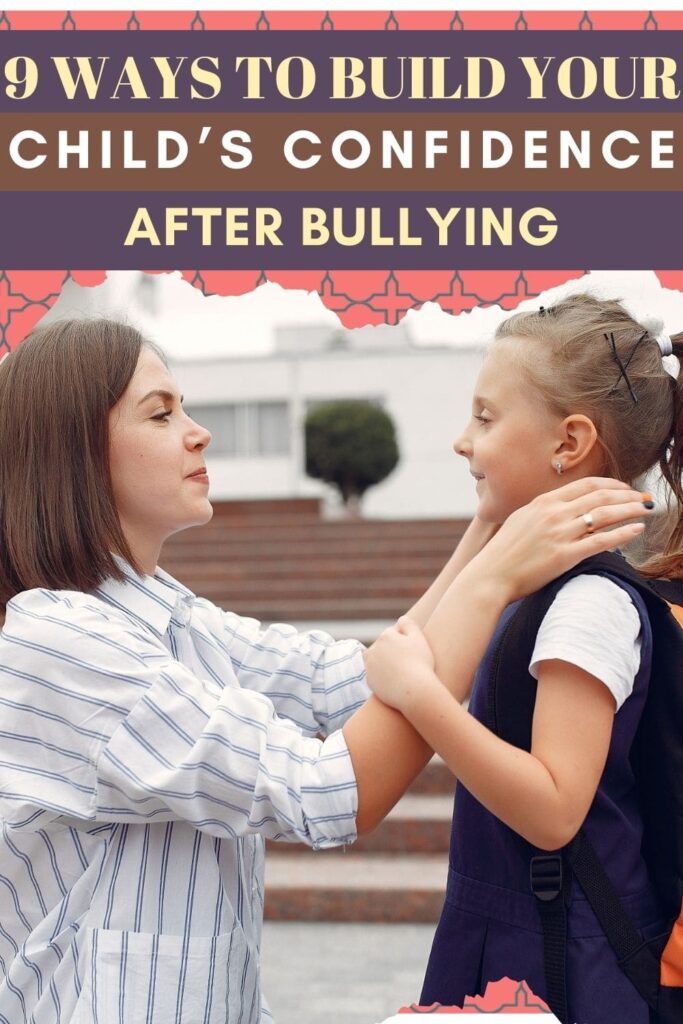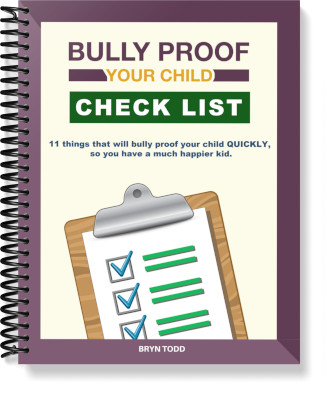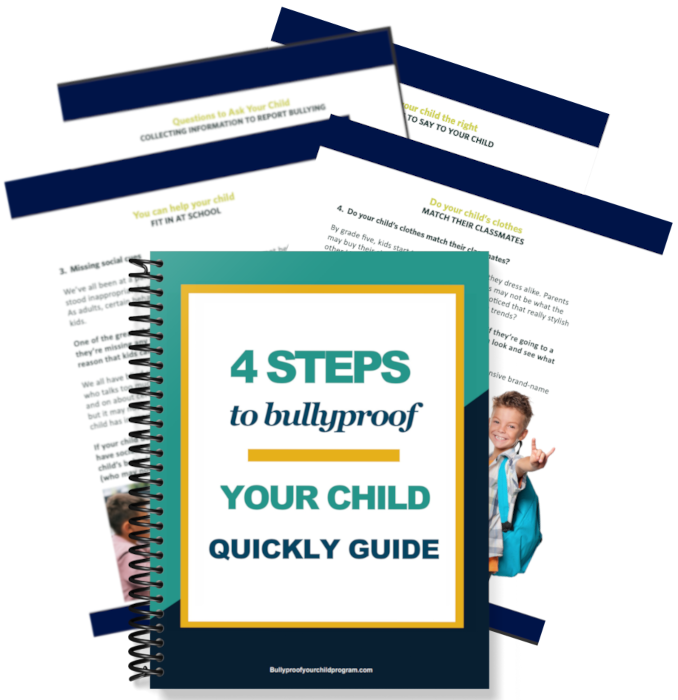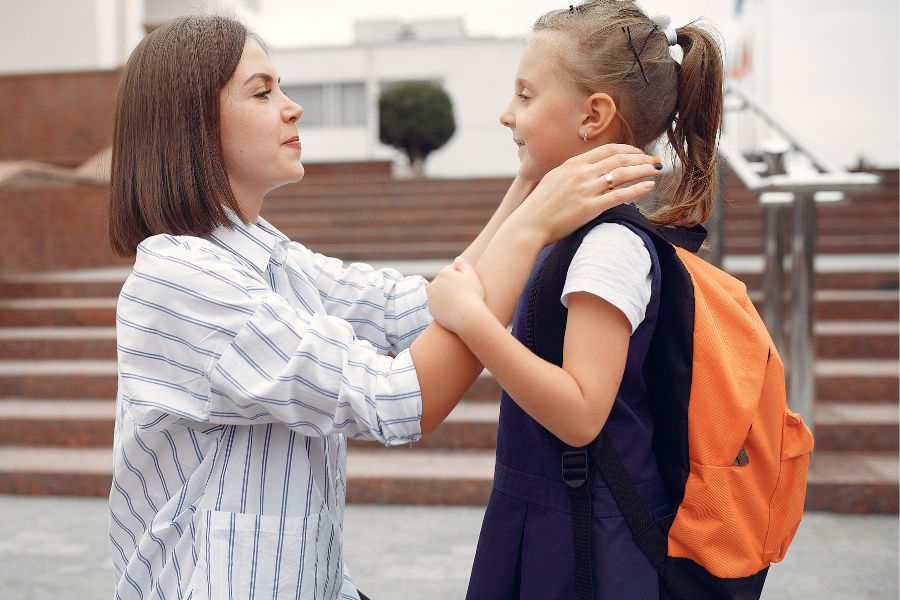
Imagine your child has been through a really tough time because of bullying. It’s like they’ve been caught in a rainstorm and now, we need to help them find their rainbow. This post is all about giving them back their sparkle and building confidence after bullying.
We’re going to talk about simple, heartfelt ways to make them feel good about themselves again, how to help them stand tall after falling down, and how to wrap them up in so much love and support that they can’t help but feel strong again.
Let’s walk this path together, filling their world with positivity, understanding, and lots of high-fives. It’s time to help our kids shine bright once more.
1. Rebuilding Self-Esteem
What your child hears from you on a daily basis becomes their inner voice. If you tell your child that they can’t achieve something, they will believe you.
Positive Affirmations
Positive words can be like magic spells for your child’s heart and mind. Imagine your kid starting each day by saying, “I am strong” or “I am worthy of love and respect.” These simple words can light up their world, especially on tough days.
Why not make these powerful phrases a part of their daily routine? You could write them on sticky notes and put them on the bathroom mirror or tuck them into their backpack.
Every time they see these messages, it’s a little reminder of how amazing they truly are. It’s like planting seeds of confidence that will grow into a garden of self-esteem.
Encourage Personal Strengths
Boosting your child’s self-esteem can also be done by shining a light on what they’re good at. Everyone has something they excel in, and your child is no exception.
Take some time to help them see what those things are. If they have a knack for drawing, encourage them to take art classes or enter their work in contests. It’s about letting them see their own value through the things they do well.
When they engage in activities that highlight their strengths, it not only builds their confidence but also gives them a sense of pride in who they are.
2. Developing Resilience
Helping your child become stronger after bullying means building their resilience. Think of resilience like a muscle—the more you use it, the stronger it gets. It’s about teaching your child to face tough times and come out okay on the other side.
When life gets hard, resilience helps your child get back up. It’s showing them that even when things go wrong, they have the strength inside to deal with it and move forward.
Building this kind of strength takes time and lots of encouragement from you.
Here are two ways to help your child develop resilience:
Teach Problem-Solving Skills
Teaching your child how to solve problems is like giving them a toolkit for life. When something tough comes up, instead of feeling stuck, they’ll start thinking, “Okay, what can I do about this?” It’s about guiding them to see there’s not just one way to fix a problem but many.
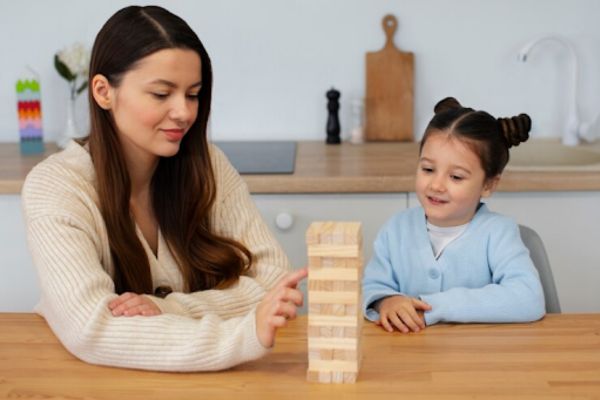
Ask them, “What’s one thing you can try?” or “How else could we look at this?” This way, you’re not just handing them the answers but helping them build the skills to find those answers themselves. It boosts their confidence, showing them they’re capable of facing challenges head-on.
More posts you may like
- When your child isn’t invited to a party
- How to build confidence in a sensitive child
- My child is at a new school with no friends
3. Encourage Social Connections
Helping your child find friends and people who care about them is like building a safety net of hearts around them. When they have friends and family cheering them on, they feel stronger and less alone. Encourage them to join clubs or teams where they can do what they love.
This is how they’ll meet others who share their interests. It’s these connections that can turn a bad day into a better one, just by knowing someone is there for them.
Building this kind of strength doesn’t happen overnight. It’s a journey you’re on together. Keep reminding them to reach out, make friends, and stay connected. Your belief in them, your patience, and your encouragement mean everything.
Together, you’re building the resilience they need to face not just bullying, but any challenge life throws their way.
4. Creating a Supportive Environment
Creating a warm, supportive space for your child is like wrapping them in a big, comforting hug after they’ve been through a tough time with bullying. It’s about making home a place where they can heal, grow, and regain their confidence.
Here are some ways to do that:
Maintain Open Communication
Keeping the lines of communication open with your child is like keeping a door wide open for them, anytime they need it. Let them know, in every way you can, that you’re there to listen, not just with your ears, but with your heart too.
When they share how they feel, let them see in your eyes that what they’re going through matters to you.
Don’t brush off their worries with a “you’ll be fine” or “just forget about it.” Sit with them, feel with them, and let them know their feelings are real and important.
This kind of understanding and empathy is a powerful way of showing your child they’re not alone, helping them feel seen and supported.
Involve School or Community Resources
Reaching out to school or community resources can be a game-changer in supporting your child through tough times. It’s like assembling a team where everyone’s ready to help your child feel safe and valued again.
Start by talking to your child’s teacher or the school counselor. Share what’s been happening and ask for their help. They’re often equipped with tools and resources, like counseling or mentoring, that can make a big difference.
Also, think about getting your child involved in community activities, like youth groups or sports teams. These aren’t just fun; they’re places where your child can make friends, feel part of something positive, and rebuild their self-esteem piece by piece.
Remember, creating this circle of support around your child doesn’t happen overnight. It’s a journey that requires patience, love, and consistent effort from you.
Keep showing your child they’re not alone, and together, you’ll navigate through this, building a stronger, more resilient spirit along the way.
5. Build Friendships Outside of School
Helping your child find friends outside of school can be a big step towards healing after they’ve faced bullying. It’s like giving them a new canvas to paint their social life on, one where the past doesn’t have to define their future.

Getting them involved in activities they love, like joining a local sports team, taking art classes, or learning an instrument, can open doors to friendships with kids who share their interests.
These aren’t just hobbies; they’re bridges to meeting others who “get” them. Plus, mastering a new skill can make your child feel proud and confident in themselves.
Community events or volunteering are also great ways for your child to meet people who care about the same things they do.
It’s not just about making friends; it’s about connecting with a community and feeling like they’re part of something bigger. This sense of belonging can be incredibly empowering.
Remember, finding true friends takes time. Encourage your child to keep being themselves and to keep reaching out. It’s about finding people who appreciate them for who they are, not who they think they need to be.
By supporting your child in making friends outside of school, you’re helping them build a circle of support that can lift them up, boost their self-esteem, and show them they’re not alone.
6. Show Up With Physical Confidence
After being bullied, your child might start doubting how they look or what their body can do. It’s important to help them find their way back to feeling strong and proud of themselves. Here’s how you can help:
First, think about getting them into a fun physical activity. Maybe they’d love to dance, join a soccer team, or try martial arts.
These activities are great for building skills, feeling part of a team, and seeing what their bodies are capable of. It’s about giving them chances to shine and feel proud of what they can achieve.
Also, talk to them about looking after their body. Eating well, getting enough sleep, and staying clean can make a huge difference in how they feel about themselves. When they feel good on the inside, it shows on the outside too.
Don’t forget to lead by example. Show them how you take care of yourself and find joy in moving your body. When they see you living confidently and happily, they’ll be inspired to do the same.
Helping your child feel good about their body is a big step in overcoming the hurt from bullying. By encouraging them to move, take care of themselves, and see you doing the same, you’re helping them rebuild their confidence and remember their worth.
7. Empowering Through Activities
Helping your child feel strong again after bullying can start with something as simple as doing things they love. When your child gets involved in activities they enjoy, it’s like watching them light up from the inside.
It could be painting, playing an instrument, or building model airplanes—whatever makes their heart sing. These activities do more than just pass the time; they remind your child of their talents and strengths, giving them a real sense of achievement.
Here are two ways to empower your child through activities:
Promote Extracurricular Interests
Encouraging your child to dive into extracurricular activities they love is like giving them wings. Whether it’s hitting a ball, strumming a guitar, painting a canvas, or anything else that sparks joy in their heart, these activities do wonders.
They’re not just hobbies; they’re pathways to feeling proud and sure of themselves. Plus, it’s a chance for them to meet others who get excited about the same things. This can be a fresh start, a way to form friendships based on shared passions.
Watching your child find their place and thrive in it, seeing that spark of confidence light up in their eyes—that’s the power of letting them pursue what they love.
Foster a Growth Mindset
Helping your child see challenges as stepping stones, not stumbling blocks, is key to nurturing a growth mindset. It’s about teaching them that every mistake is a lesson, not a failure.
Encourage them to set goals they can reach, and then do a little happy dance together for every step they take forward. This journey isn’t about being perfect; it’s about trying, learning, and growing stronger bit by bit.
Focusing on effort rather than just wins teaches your child that their hard work and determination are what truly matter. This shift in perspective can transform how they see themselves and the world around them, turning setbacks into comebacks.
Rebuilding confidence, especially after bullying, is a gentle process that needs your love and patience.

Through activities that spark joy and a mindset that sees possibilities, you’re helping your child find their way back to feeling capable and confident. This is how they learn to stand tall again, ready to face the world with a brave heart.
8. Catching Your Child Doing Something Right
Spotting your child doing something good and letting them know you’ve noticed is like sprinkling a little magic on their day. It’s about seeing them help out, share, or even just trying their best, and then telling them, “Hey, I saw what you did there, and it was awesome.”
This isn’t about big trophies or grand gestures; it’s the little moments that count. Every time you acknowledge the good things they do, it’s like you’re building them up, brick by brick, helping them see the wonderful person they are.
This way, after facing bullying, your child starts to feel valued and sees that what they do matters. It’s a simple yet powerful way to help them regain their confidence.
Here are some tips for catching your child doing something right:
- Be Specific: When you see your child doing something great, tell them exactly what they did that made you proud. For example, instead of a simple “good job,” you could say, “I’m really proud of how you stood up for yourself when someone was teasing you.” It shows you’re paying attention.
- Use Positive Words: Always use words that lift your child up. Instead of focusing on what they shouldn’t do, like “don’t be scared,” try saying, “You’re so brave for facing what scares you.” It’s a way of shining a light on their courage.
- Make it a habit: Aim to notice and praise something good about your child every single day. It’s a way to make them feel seen and cherished, reinforcing the good things they do.
- Create a chart: Setting up a chart to track the good stuff your child does can turn it into a fun game. It’s a visual way for them to see all the positives stacking up.
- Involve others: Encourage everyone in your child’s life, like family, teachers, and friends, to also notice and praise the good things your child does. It takes a village to build a child’s confidence.
- Model positive behavior: Show your child how it’s done by praising others for their positive actions. When they see you doing it, they’ll be inspired to spread positivity too.
9. Ongoing Monitoring and Encouragement
Keeping an eye on how your child is doing and cheering them on is crucial after they’ve been through bullying. It’s like being their personal cheerleader and guardian angel rolled into one.
Watch for any changes in how they act or feel, and be there to lift them up with kind words and hugs.
Let them know you’re always on their side, ready to listen and help them through anything. This ongoing support is a beacon of light for them, guiding them back to feeling happy and confident. Remember, your encouragement is their strength.
Here are some ways to do that:
Regular Check-Ins
Always keep the conversation going with your child. Make it a point to gently ask how they’re doing, if they’ve faced any bullying, or how they’re feeling about things in general.
Show them that your door and heart are always open for them, no matter what. It’s like letting them know they have a safe space with you, where they can share anything that’s on their mind.
Don’t forget to touch base with their teachers and anyone else they spend a lot of time with. See if they’ve spotted any changes in how your child acts or if they’ve seen any signs of bullying.
This way, you’re not just relying on what you see; you’re getting the full picture. It’s all about being there for your child, ready to step in and help the moment they need it.
Reinforce Positive Behavior
Always shine a light on the good things your child does and the big steps they’re taking. Let them know how proud you are when they show kindness, bravery, or any positive action.

It’s like giving them a high-five for their heart and spirit. These moments of praise can make their confidence soar.
Think about setting up a little rewards system, too. If they’re brave enough to stand up to a bully or they reach out to make a new friend, celebrate that with something they love, like an extra story at bedtime or a trip to their favorite park. It’s a way to show them that their courage and kindness are truly valued.
Remember, helping your child feel strong and valued again after being bullied is a journey. With your constant support and belief in them, they can start to see their own worth and shine brightly, leaving the shadows of bullying far behind.
10. Celebrate Successes
When your child reaches a goal or improves in some way, throw a little celebration. It’s important for them to know that their efforts are worth celebrating, making them feel proud.
Cheering on your child’s small victories is key. It could be a good grade, a new friend, or even just trying something new. Make a big deal out of these moments. Show them how proud you are. This makes them see their own worth and boosts their confidence bit by bit.
Building up self-esteem doesn’t happen overnight. It’s a journey. But with your support through kind words, believing in their strengths, and celebrating every little success, you’re helping your child grow stronger and more confident. Keep at it, and you’ll see them shine.
Frequently Asked Questions:
1. How can parents support their child’s self-esteem following a bullying incident?
After your child has been hurt by bullying, the most important thing you can do is make sure they feel safe and loved at home.
Let them know it’s okay to talk about what happened and how they feel. Listen to them, really listen, and tell them their feelings matter and it’s not their fault. Remind them they’re not alone in this.
Help them see all the amazing things about themselves. Point out their talents and the things they do that make you proud. Encourage them to keep doing the things they love, whether it’s drawing, playing sports, or anything else that brings them joy.
It’s these things that will help them remember how special they are, rebuilding their confidence piece by piece.
2. What are effective strategies to help children cope with the effects of bullying?
When your child is hurting from bullying, there are powerful ways you can help them heal and stand strong. First, teach them how to speak up for themselves with kindness and confidence. It’s like giving them a shield and sword made of words.
Encourage them to say positive things about themselves, to see themselves as brave and strong, even when it feels hard.
Show them how to breathe deeply, to find a quiet spot inside themselves when the world feels too loud. Meditation can be like their secret garden, a place of peace they can always go to.
And most importantly, help them weave a net of people who care about them—friends, family, and teachers who will stand by them. This net will catch them when they fall and help them feel less alone.
Together, these strategies are like building a fortress around your child’s heart, teaching them not just to survive the effects of bullying, but to thrive in spite of them.
3. Can engaging in extracurricular activities boost a bullied child’s confidence?
Absolutely, diving into extracurricular activities can be a game-changer for a child who’s faced bullying. It’s like opening a door to a world where they can leave their past troubles at the doorstep and step into a space filled with possibilities and joy.
Engaging in sports, music, art, or any club that sparks their interest not only distracts them from their worries but also places them in a supportive environment where they can excel at what they love.
This isn’t just about filling their time; it’s about helping them rediscover their self-worth and build confidence through achievements and forming new, meaningful friendships.
Such activities provide a solid foundation for them to stand on, showcasing their talents and contributing to a sense of pride in who they are. It’s a powerful step towards healing, allowing them to see themselves in a new light and embrace their strengths.
4. What role does positive reinforcement play in rebuilding a child’s confidence after being bullied?
Positive reinforcement plays a crucial role in helping a child rebuild confidence after experiencing bullying. It acts as a powerful tool that shines a light on their strengths and achievements, guiding them out of the shadows of their experiences.
By acknowledging and celebrating even the smallest successes, you’re not just offering praise; you’re helping your child see their own worth and resilience.
This consistent and focused encouragement nurtures a growth mindset, teaching them that they are capable of overcoming obstacles and growing stronger from their experiences.
It’s a way of rekindling their self-belief and fostering a positive self-image, which is essential for them to stand tall and feel secure in who they are.
5. How can teaching resilience skills help a child recover from bullying?
Showing your child how to be resilient is like giving them a shield and a compass in the face of bullying. It’s about teaching them ways to handle tough times, to know deep down that they can get through anything.
When you help them set small goals and reach them, it’s like lighting stars in their night sky, one by one, guiding them forward.
Teaching them to solve problems, to look at a challenge and find a way through, plants seeds of strength in their hearts. And when you talk about finding the silver lining, even on cloudy days, you’re helping them see the world in a brighter light.
This journey of building resilience is how they learn to stand up after falling, to believe in their power to overcome hurdles. It’s how they start to see that, yes, they can face tough times and emerge stronger.
6. What is the importance of open communication with children about their bullying experiences?
Having open conversations with your children about their experiences with bullying is incredibly important for their healing and emotional health. It’s like opening a door for them to share their worries and fears in a safe space.
When you encourage your child to talk and really listen to what they’re saying, acknowledging their feelings as valid, it does wonders for their sense of being understood and supported.
This kind of communication helps them know they’re not alone. It also lays the foundation for them to learn healthy ways to deal with their emotions and challenges.
By being there for them, listening, and guiding them, you’re not just helping them process what happened; you’re also teaching them resilience and how to navigate difficult situations in the future.
